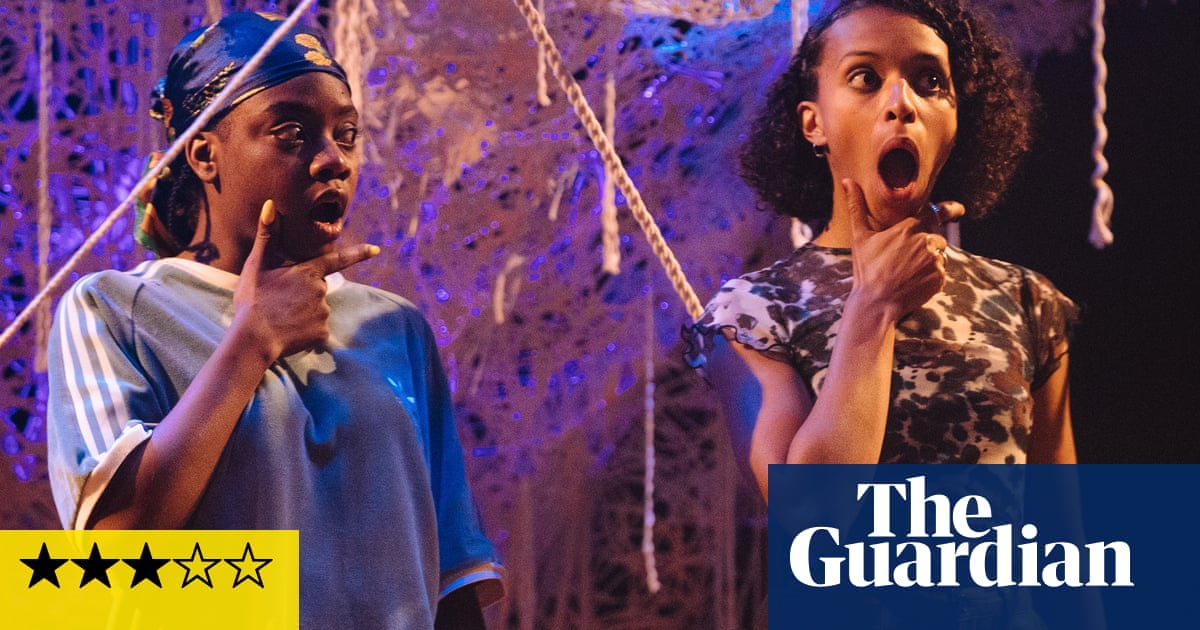Jasmine Lee-Joness play follows an online battle about the Instagram star and tackles racism, misogyny and colourism

The lights are still dead when this play opens. A wrapped-up body is dragged on stage and dumped in a grave. This is not the outright murder it seems but the acting out of a digital fantasy. The imagined victim is the titular celebrity. Her virtual killer is Cleo (Danielle Vitalis), who has created a Twitterstorm with threatening messages suggesting ways to kill her (method 1: death by poison).
The reason she wants Jenner dead, Cleo tells her friend Kara (Tia Bannon), is because she has appropriated black women’s beauty, wearing it as a “costume” for profit. Jenner’s cosmetic fillers may have brought large lips into fashion “but when MAC Instagrammed a picture of a black model with lips of the same width she was called ugly”.
Jasmine Lee-Jones’s play is as much about the drama of social media and how we behave on it, as it is about race, slavery, white supremacy, colourism and the offensive cultural tropes that surround black women. Many of these themes are debated between the two friends but the best and most inventive parts come when the Twitterstorm is dramatised by them.
Even as this virtual medium is satirised and mocked, it retains a sense of real danger and psychological darkness. The Twittersphere interludes in the play are filled with smoke, flashing lights, electronic voice distortion and thrillerish music, and they evoke a kind of modern gothic. In Rajha Shakiry’s design, the stage comprises a series of wooden platforms with a cellar-like opening that functions as the grave. Vitalis and Bannon act out the alternate reality with gleeful menace, striking poses, pulling faces and enacting a devilish comic outrage.
The tweets they perform are by turns funny, angry and deeply offensive, complete with laughs and screeches, acronyms (LOL, FFS, OMG) and monkey impressions enacted from the racist tweets.
This is a desperately topical play that wears the politics of gender, identity and race on its sleeve – sometimes too much so. Cleo and Kara openly debate the issues and while they deliver hard-hitting messages, it sometimes feels as if the characters have stepped outside the drama to comment on the world. And despite the intrigue of the title, it feels fairly plotless and sometimes static, even though Lee-Jones’s dialogue is acerbic and entertaining.
It never stops being clever, though; there is a standoff between the audience and actors at the end that seems to reflect how social media has created the need for the same loop of feedback, interaction and instant response in real life. Theatre doesn’t give you that, Cleo realises, as she looks around the audience, mystified by the silence: “They’re just sat there, not saying anything.”
• At the Royal Court, London, until 27 July.
This article contains affiliate links, which means we may earn a small commission if a reader clicks through and makes a purchase. All our journalism is independent and is in no way influenced by any advertiser or commercial initiative. By clicking on an affiliate link, you accept that third-party cookies will be set. More information.
Read more: www.theguardian.com





![[Video] How to get rid of bed bugs in Toronto](https://www.thehowtozone.com/wp-content/uploads/2019/10/maxresdefault-2-100x70.jpg)


